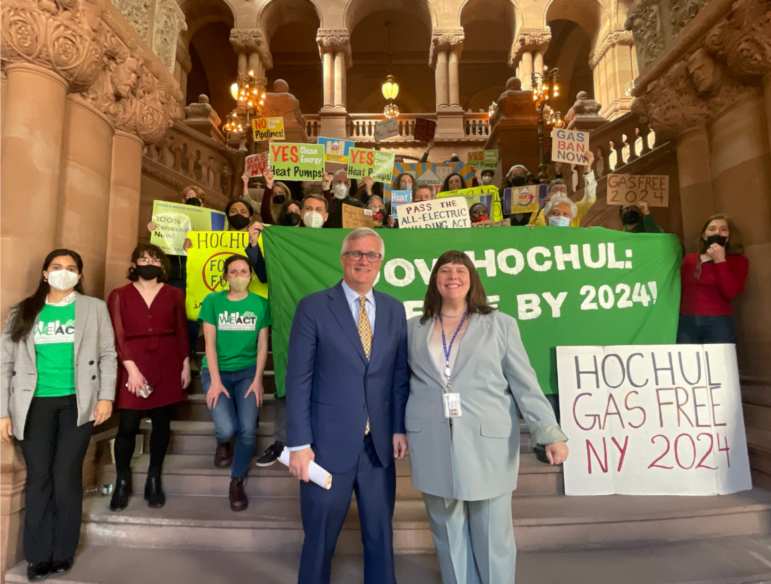A call for Gov. Kathy Hochul to push the legislation through in budget negotiations comes as the Intergovernmental Panel on Climate Change announces a new warning about fossil fuels. But sources say the bill will be excluded from the week-late spending plan, forcing lawmakers to hammer it out in the remaining months of the legislative session.

Assemblymember Gallagher’s office
State lawmakers and environmental advocates at a March rally in Albany calling for passage of the All-Electric Building Act.
Environmentalists are planning to protest Thursday following news that a measure to ban gas hookups in new construction across the state starting in 2024 has been left out of the forthcoming budget deal—Gov. Kathy Hochul’s first since taking office.
A legislative staffer close to the negotiations confirmed its absence from the final budget plan, which is a week past the state’s April 1 deadline, but added he is optimistic the bill will pass this legislative session. Hudson Valley news site The River was first to report on the exclusion late Wednesday.
The proposed legislation, the All-Electric Building Act, follows a similar law passed by the New York City Council under former Mayor Bill de Blasio in December.
New York would be the first state to pass such a policy. The bill has gained widespread support, with more than 600 people who have spoken out in favor of it over the past two weeks, according to the nonprofit Food & Water Watch. Advocates have staged press conferences over Zoom and held rallies outside Hochul’s office.
“This is a policy that would advance multiple goals,” organizer Eric Weltman of Food & Water Watch told City Limits. “It will clean the air. It will create good green jobs. It will move us off of fossil fuels at a time when gas prices are skyrocketing.”
On Thursday, organizers with Food & Water Watch, along with New York Communities for Change and other environmental organizations, plan to protest at the office of State Assembly Speaker Carl Heastie, who they say has been “balking” at the inclusion of the bill in the budget.
“As a general rule we didn’t include policy in our budget proposal,” said Michael Whyland, the speaker’s press secretary, in an email to City Limits. “I know these groups may not like the answer, but whatever we do on this issue—or any issue—is guided by the sense of the entire democratic conference.”
The legislation will be left instead for lawmakers to hammer out over the remaining months of the legislative session, which ends in June.
But advocates argue a report released earlier this week on the impact of fossil fuels signals a “now or never” urgency to reduce carbon emissions. The Intergovernmental Panel on Climate Change (IPCC), a consortium of scientists from 195 nations, released the third part of its Sixth Assessment Report focused on climate change mitigation. The panel found that greenhouse gas emissions must peak no later than 2025 and be reduced by nearly half by 2030 in order to prevent global warming from exceeding 1.5 degrees Celsius above pre-industrial temperatures.
“Even if we do this, it is almost inevitable that we will temporarily exceed this temperature threshold but could return to below it by the end of the century,” the report’s authors wrote.
Buildings are notorious for being hefty contributors to greenhouse gas emissions; the United Nations Environment Programme estimates that the construction and operations of buildings contributes 38 percent of global carbon dioxide emissions.
Notably, New York has the most building emissions of any state, according to a report by RMI.
The pollutants from buildings not only contribute to climate change and global warming but also can impact the health of surrounding communities. Researchers at Harvard T. H. Chan School of Public Health examined data from 2017 and found that 1,940 New Yorkers died prematurely due to particulate matter related to burning fossil fuels in buildings, according to a study published last year.
READ MORE: Low-Income Housing in NY Burns Fossil Fuels More Than Other States, Study Finds
“The All-Electric Building Act is exactly the kind of legislation the IPCC report calls for,” said Annie Carforo, of WE ACT for Environmental Justice, at a virtual press conference Tuesday, “phasing out fossil fuels and electrifying our buildings, the primary source of the greenhouse gas emissions that cause climate change.”
Critics of the gas ban bill, however, claim the legislation would increase utility costs for consumers and that cleaner alternatives, like heat pumps, are less reliable than natural gas.
The Real Estate Board of New York is supportive of the Governor’s proposal that requires the building codes be updated to establish that new construction be all-electric beginning in 2027, not 2024, according to a spokesperson with the organization. “This proposal appropriately balances the need to reduce emissions from buildings with the ability of the development and supplier community to efficiently accomplish this goal,” he said.
State Assembly Member Emily Gallagher, who sponsored the bill in the Assembly, joined environmental groups at a virtual event Tuesday urging the governor to consider following New York City in implementing the statewide legislation.
“We can’t let the decisions of our past dictate our future,” Gallagher said. “Fossil fuels and their money must become unwelcome in New York.”
*This story was updated since original publication to clarify REBNY’s position on the proposal.










16 thoughts on “Statewide Gas Ban Bill Axed From NY Budget, Sources Say”
NYS, and NYC homeowners better wake up soon to what’s really going on in this debate over gas hookup. Gas is the cleanest source for heating and cooking. Electric heating is massively expensive despite the fantasy of cheap hydro-power from Quebec. Heat pumps are not practical in areas with high water tables like most of SI, and large parts of Queens and Brooklyn. Electric stoves are garbage, ask any cook.
Once homeowners are forced to use electricity NYS will find a way to take over the utilities in the state. Not only that, but how is not a restraint of trade to force homeowners to use only one non-competitive energy source in their private homes? NYS wants to slowly gain control over our homes. And don’t buy the ‘it will only apply to new construction’ line of nonsense. That will only be the first step before their ultimate goal of imposing crushing costs on all private homeowners is accomplished, lowering the value of every home in NYS, including NYC.
Electricity is cleaner than gas for heating and cooking. Water table doesn’t have an impact on heat pumps. You’re talking geothermal setups, a particular type and high water tables just require a different type of installation. Electric induction stoves are considered the best.
Electricity is expensive now but natural gas prices are less stable. There is going to be a point when electric power generation becomes cheaper. Sooner than you think.
Heat pumps don’t work in cold climates
What? Of course they work in cold climates. People already use heat pumps in some NYC buildings for heating.
Heat Pumps lose their efficiency after temperatures reach 40 degrees, at which point they use more energy than it takes for them to produce electricity.
On top of that, if the power goes out for more than 30 minutes, you’re out of luck and have to replace the entire unit.
Do some research instead of expecting everyone to jump on board your ship.
This bill will hurt more than help its not in the peoples interest why does the Government keep punishing people just trying to make a better life Gas is clean
Tell the people how they make most of the electricity then we can have a real conversation Thanks ps ever try cooking a Turkey in an electric oven
Gas is not clean. Natural gas, though cleaner than say oil still pollutes.
Modern convection ovens are excellent.
You’ll figure it out when you buy an ear of corn for $8 and a gallon of milk for $20.
Then you will blame the farmers and want to ban cows, which is already in the works.
When the power goes out for a few days, in -20f temps, like it did for us last year, you better have a plan and one that doesn’t include people who are already footing the bill in this over taxed state for nonsense to further foot your rescue.
I see no problem with requiring new home construction not being powered by natural gas, propane or any other fossil fuel. The question is: Buffalo in the past 15-20 years has experienced multi-day electrical outages. Two of these occurred during winter. Natural gas delivery was not affected. What provisions will be in place to provide heat to these buildings so that the death toll from hypothermia is kept to acceptable levels? Infrastructure damage will also occur from freezing pipes.
The problem with depending on fossil fuels is pollution and instability. Just because natural gas was consistent during that event does not mean it always will be.
Odd, my Propane never runs out… When I need more, they deliver…
Kirk, that’s exactly my question!! Once we are total electric, when the power goes out, and it will, how will we not freeze to death in the winter? Nobody seems to be addressing this very important question.
Really hard to believe that the writer says it has gained a lot of support with 600 people. People are clueless on this as the government wants everyone to be until it is too late. I hope all you people that agree are driving EV, have solar panels on your roofs. The grid cannot support all the electrical demands. Cart before the horse is what the government is trying to do.
First the guns now the gas.
No.. Electricity.
Now they have FULL control. Right?
How many total kilowatt hours are going to be needed to power electric everything? – –
– There wont be enough kwH generated from wind , water and solar without natural gas burning electric plants. Especially after you ban the gas powered cars.
– Building wind and solar power generators is not a carbon neutral process in some cases you’ be better just burning natural gas.
– NY state can’t be heated by an unreliable power source such as the electrical grid. You will kill people in the winter doing that and wont have enough shelters with gas burning generators for shelters.